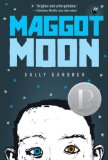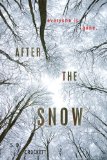Summary | Excerpt | Reading Guide | Reviews | Beyond the book | Read-Alikes | Genres & Themes | Author Bio

One hundred very short chapters, told in an utterly original first-person voice, propel readers through a narrative that is by turns gripping and darkly humorous, bleak and chilling, tender and transporting.
What if the football hadn't gone over the wall. On the other side of the wall there is a dark secret. And the devil. And the Moon Man. And the Motherland doesn't want anyone to know. But Standish Treadwell - who has different-colored eyes, who can't read, can't write, Standish Treadwell isn't bright - sees things differently than the rest of the "train-track thinkers." So when Standish and his only friend and neighbor, Hector, make their way to the other side of the wall, they see what the Motherland has been hiding. And it's big...One hundred very short chapters, told in an utterly original first-person voice, propel readers through a narrative that is by turns gripping and darkly humorous, bleak and chilling, tender and transporting.
The political circumstances that gave rise to the classic dystopian novels of the twentieth century are in no way gone from the world. Today's young people have to make sense of grim facts about torture and totalitarianism in the news, so it makes sense to give them books in which to work through these moral dilemmas. Still, Maggot Moon won't be right for every kid, even those who fall into the suggested range of age 12 and up. The kids who do read this will benefit from some serious follow-up conversations with their parents and teachers. With the right perspective, there is something transcendent, even ebullient, about Standish Treadwell's point of view...continued
Full Review
(627 words)
This review is available to non-members for a limited time. For full access,
become a member today.
(Reviewed by Jennifer G Wilder).
DYS- (bad, Greek) LEXIA (language, Greek)
A German ophthalmologist named Rudolph Berlin coined the word dyslexia in 1887 to describe patients who, in spite of normal intelligence, had extreme difficulties with reading. Scientific discussion of the phenomenon of what was also called "word blindness" emerged in the late nineteenth century, but the term dyslexia has only become widely accepted in the fields of education and psychology in the last fifty years. It has come to be an umbrella term for a range of problems in the use and decoding of written language, one of the disorders educators have come to call "learning disabilities" along with dysgraphia (writing impairment) and dyscalculia (math impairment).
Dyslexia is known to be a ...
This "beyond the book" feature is available to non-members for a limited time. Join today for full access.

If you liked Maggot Moon, try these:

by S. D. Crockett
Published 2013
After the extremely hard winter of 2009, S. D. Crockett asked herself, "What if winter never ended?" and from that thought, her debut novel, After the Snow, was born.

by Louis Nowra
Published 2013
Two girls survive a terrible flood in the Tasmanian bush and are rescued by a pair of Tasmanian tigers who raise them in the wild. Totally believable, their story will both shock and captivate readers as it explores the animal instincts that lie beneath our civilized veneer and celebrates the ways of the tiger.
Finishing second in the Olympics gets you silver. Finishing second in politics gets you oblivion.
Click Here to find out who said this, as well as discovering other famous literary quotes!